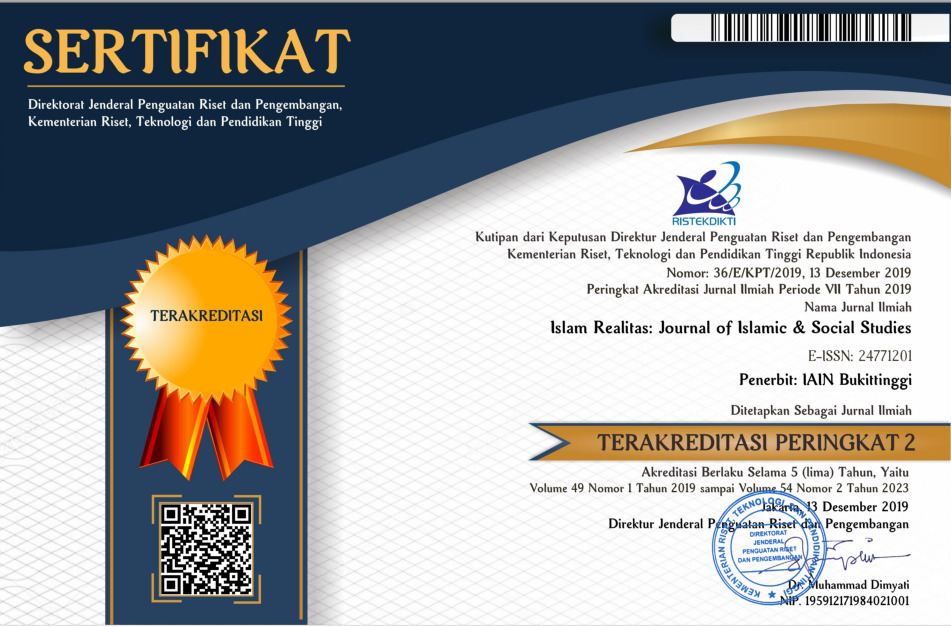HUKUM DAKWAH DALAM AL-QUR' AN DAN HADIS
DOI:
https://doi.org/10.30983/fuaduna.v1i1.439Abstract
References
A.Hasjmy, Dustur Dakwah Menurut al-Qur’an,Jakarta: Bulan Bintang, 1974
Ali Azis Muhammad, Ilmu Dakwah, Jakarta: Kencana, 2004
________, Ilmu Dakwah, Jakarta: Kencana, 2009
Ar-Razi Al-Imam Muhammad, Tafsir Fakhrur ar-Razi, Beirut Libanon: Dar al-Fikr, 1415H
Al Amidi Yahya bin Basyir bin Husain, Tafsir Al Amidi
Ali Mahfudz, Hidayah Al-Mursyidin Ila Ath-Tharig Al-Wa’dziwa Al-Khitabah,Mesir: Dar Al-I’tisham t.t
Ahmad Arrazi Al-Jhasas Abi Bakri imam, Beirut Libanon: Darul Fikri, 2001
Al-Maraghi Mustafa ahmad, Tafsir Al-Maraghi Terjemah, Jilid 4 Semarang: Toha Putra, 1993
Al-Qasimi Jamaluddin Muhammad, Tafsir al-Qasimi, Beirut: Dar al-Fikr, 1978
Abi al-Husain Ahmad bin Faris bin Zakaria, Mu’jam Muqayyis al Lughat,Mesir: Mustafa al Baabi, 1996 dalam buku Salmadanis, Filsafat Dakwah, Jakarta: Surau,2003
Hasanuddin, Hukum Dakwah, (Jakarta: Pedoman Ilmu Jaya, 1996
Hamka, Tafsir al-Azhar, Jakarta: Pustaka Panjimas, 1983
Karni Awis, Dakwah Masyarakat Kota, Jakarta: The Minangkabau Fondations, 2006
Masturah Lenggam, Metode Dakwah Allati Hiya Ahsan, Padang: Makalah Program Pascasarjana IAIN Imam Bonjol Padang, 2009)
Muhiddin Asep, Dakwah Dalam Perspektif Al-Qur’an, Bandung : CV Pustaka Setia, 2002
Mustafa Dieb Al-Bugha Muhyidin Mistu, Syarah Kitab Arba’in An-Nawawiyah, Jakarta: 1998
M. Natsir, Fiqud Dakwah, Semarang: Roma Ahani, 1989
Salmadanis, Dakwah Dalam Perspektif Al-Qur’an dan Hadis, Jakarta: TMF, 2000
Syarifuddin Amir, Ushul Fiqh Jilid 1, Ciputat: Logos Wacana Ilmu: 1997
Shihab M. Quraisy, Tafsir al-Misbah, Jakarta: Lentera Hati, 2007
Downloads
Published
How to Cite
Issue
Section
Citation Check
License
Authors who publish with this journal agree to the following terms:
- Authors retain copyright and grant the journal right of first publication with the work simultaneously licensed under a Creative Commons Attribution-ShareAlike 4.0. that allows others to share the work with an acknowledgment of the work's authorship and initial publication in this journal.
- Authors are able to enter into separate, additional contractual arrangements for the non-exclusive distribution of the journal's published version of the work (e.g., post it to an institutional repository or publish it in a book), with an acknowledgment of its initial publication in this journal.
- Authors are permitted and encouraged to post their work online (e.g., in institutional repositories or on their website) prior to and during the submission process, as it can lead to productive exchanges, as well as earlier and greater citation of published work (See The Effect of Open Access).





